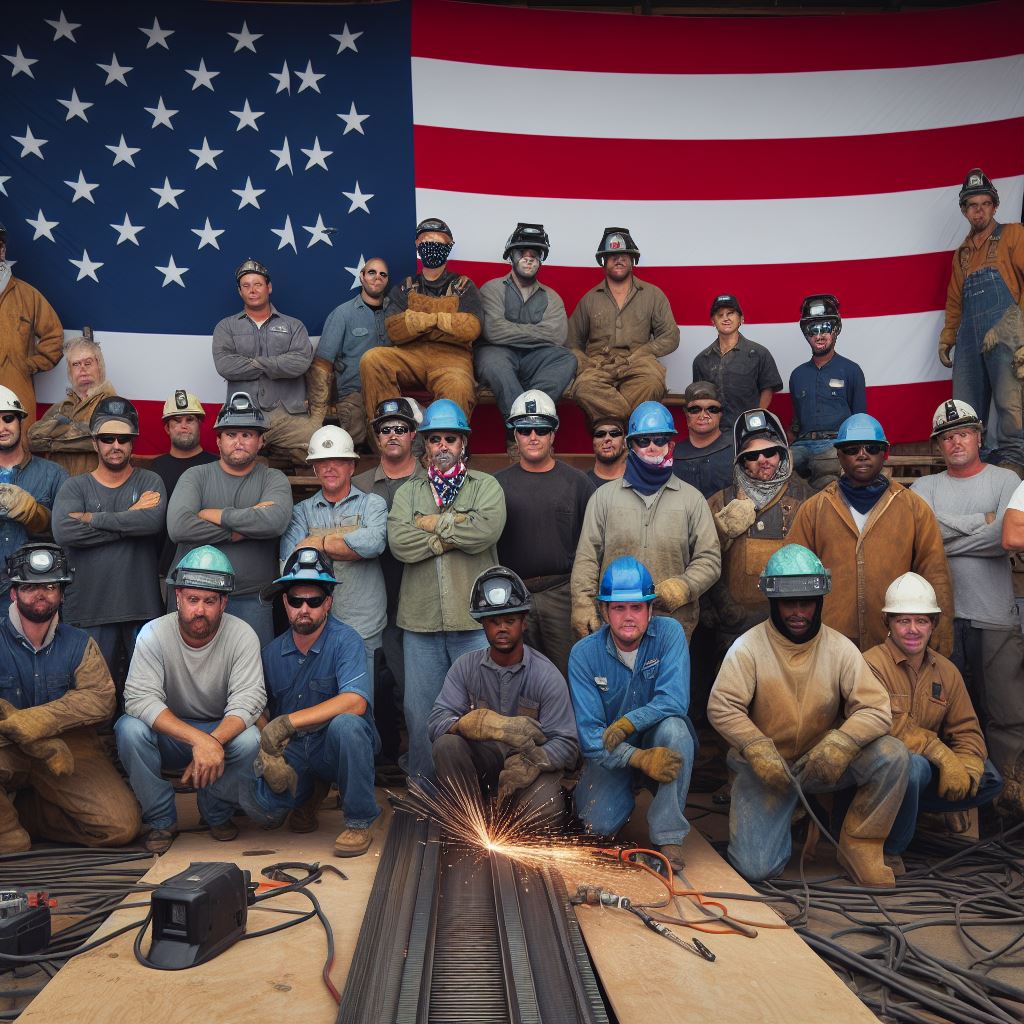Introduction
In today’s blog section, we will discuss freelance welding in the USA.
Freelance welding refers to the practice of working as a welder on a project-by-project basis, without being employed by a specific company.
The growth of freelance work has been significant in the USA, with more people choosing to work independently rather than in traditional employment roles.
It is important to discuss freelance welding opportunities and challenges as it allows individuals to have a better understanding of the industry, its dynamics, and the potential benefits and drawbacks of pursuing a freelance welding career.
By exploring these aspects, aspiring welders can make informed decisions about their career paths and identify strategies to thrive in the freelance market.
Additionally, understanding the challenges involved in freelance welding can help create awareness about the need for support systems, such as training programs and resources, that can aid freelancers in overcoming obstacles and achieving success.
So, let’s dive into the world of freelance welding and explore the opportunities and challenges that come with it.
Read: Safety Protocols Every US Welder Must Know and Follow
Opportunities for Freelance Welding in the USA
Demand for welding services
- The construction industry requires welding services for various projects.
- Welding is also in high demand in the manufacturing sector for production and repairs.
Geographic flexibility for freelance welders
- Freelance welders can take advantage of remote work possibilities, allowing them to work from anywhere.
- There are also travel opportunities available for welding projects in different locations.
Entrepreneurial advantages
- Freelance welders have the ability to set their own rates and negotiate contracts, maximizing their income potential.
- Independence and control over work environment provide freelance welders with the freedom to choose their projects and working conditions.
In fact, freelance welding in the USA offers numerous opportunities for welders.
The demand for welding services in the construction and manufacturing sectors provides a steady flow of work.
Freelancers can also enjoy geographic flexibility, enabling them to work remotely or travel for welding projects.
Moreover, the entrepreneurial advantages of setting rates, negotiating contracts, and having independence and control over the work environment appeal to individuals seeking greater autonomy in their careers.
Overall, freelance welding presents a promising option for welders looking for a dynamic and rewarding professional path.
Read: US Welder Shortage: Myth or Reality in Today’s Market?
Discover More: Eco-friendly Practices for Today’s Green Electrician
Challenges of Freelance Welding in the USA
Competition within the welding industry
Freelance welding in the USA presents several challenges that welders must face in order to succeed in this competitive industry.
One of the major hurdles in freelance welding is the intense competition that exists within the market.
The demand for welding services is high, but so is the number of welders available to meet that demand.
This saturated market means that freelancers must continuously differentiate themselves and prove their worth to potential clients.
Moreover, the welding industry is constantly evolving with new technological advancements.
Transform Your Career Today
Unlock a personalized career strategy that drives real results. Get tailored advice and a roadmap designed just for you.
Start NowFreelance welders must keep up with these changes to remain relevant and competitive.
This requires continuous learning, attending workshops, and investing in new equipment.
Staying up-to-date with the latest techniques and tools allows freelancers to offer high-quality services, but it also adds to the challenges they face.
Inconsistent income
Another significant challenge for freelance welders is the inconsistency of income.
There are often gaps between projects, leaving welders without a regular paycheck. During these periods, freelancers must find other ways to bridge the financial gap.
Some take on odd jobs or temporary work, while others use the downtime for professional development.
These income fluctuations can be stressful and require careful budgeting and planning.
Late or non-payment from clients is also a common challenge faced by freelance welders.
Unfortunately, some clients delay payment or refuse to pay altogether, which can severely impact a welder’s income and financial stability.
Freelancers must navigate this issue by setting clear payment terms and conditions, following up on unpaid invoices, and potentially seeking legal recourse if necessary.
Lack of benefits and job security
Freelance welders also lack the benefits and job security that come with traditional employment.
Unlike regular employees, freelancers do not have access to health insurance, retirement plans, or worker’s compensation.
They must bear these costs on their own or seek alternative options, such as joining professional associations that offer group health plans.
Additionally, freelancers constantly face the challenge of establishing a stable client base.
Building and maintaining relationships with clients requires consistent effort and networking.
Without a steady stream of projects, freelancers may struggle to make a sustainable living.
In essence, freelance welding in the USA presents numerous challenges for welders.
The intense competition, inconsistent income, lack of benefits, and job security all contribute to the difficulties faced by freelancers in this field.
However, with determination, adaptability, and strategic planning, welders can overcome these obstacles and build successful freelance careers.
Showcase Your Business Today
Reach thousands of readers actively exploring professional services. Publish your business profile and grow your audience now.
Publish NowRead: How to Become a Certified Welder in the United States

Uncover the Details: Health & Fitness: Keeping Up with the Demands of Construction Work
Tips for Freelance Welders to Succeed
Building a strong professional network
- Joining industry associations and attending events
- Networking through online platforms and social media
Constantly improving welding skills
- Continuing education and certifications
- Staying updated with new techniques and equipment
Creating a solid business plan
- Setting realistic financial goals
- Establishing a marketing strategy to attract clients
Freelance welding offers a flexible and potentially lucrative career path for skilled welders in the USA.
However, like any freelance profession, it also presents several challenges that individuals need to overcome in order to succeed.
Here are key tips for freelance welders to thrive in the industry.
Building a strong professional network
Joining industry associations and attending events
Being part of industry associations, such as the American Welding Society (AWS), can provide freelance welders with valuable networking opportunities.
These associations organize events, conferences, and seminars where professionals can meet, share knowledge, and form connections.
Attending such events can help welders expand their professional network and open doors to potential job opportunities.
Networking through online platforms and social media
In today’s digital age, online platforms and social media play a crucial role in connecting professionals from various industries.
Freelance welders can leverage platforms like LinkedIn and Facebook to create profiles and engage with others in their field.
Joining relevant groups and participating in discussions can help welders establish connections, gain insights, and even find new clients.
Constantly improving welding skills
Continuing education and certifications
Welding is a profession that constantly evolves, with new techniques and technologies emerging regularly.
Freelance welders should prioritize continuing education and pursue relevant certifications to stay updated and enhance their skills.
Taking courses, attending workshops, or earning additional certifications can give welders a competitive edge and demonstrate their commitment to excellence.
Staying updated with new techniques and equipment
In addition to formal education, freelance welders should stay informed about the latest advancements in welding.
Subscribing to industry publications, following industry experts and influencers, and participating in online forums can help welders stay up to date.
Knowledge about new techniques and equipment can open up opportunities to work on cutting-edge projects and differentiate themselves from competitors.
Creating a solid business plan
Setting realistic financial goals
Freelance welding requires careful financial planning. Welders should assess their financial needs and set achievable income goals.
They must consider various factors, such as overhead costs, taxes, and living expenses, and determine how much they need to earn to maintain a sustainable business.
Setting realistic financial goals ensures that welders have a clear focus and motivation to succeed.
Establishing a marketing strategy to attract clients
As independent professionals, freelance welders need to actively market their services to attract clients. Developing a strategic marketing plan can help welders reach their target audience effectively.
Creating a professional website, leveraging social media platforms, and utilizing online directories are some strategies welders can employ to promote their expertise and attract potential clients.
Additionally, maintaining positive customer relationships and seeking referrals can also contribute to business growth.
Generally, freelance welding in the USA comes with immense opportunities and challenges.
By building a strong professional network, constantly improving welding skills, and creating a solid business plan, freelance welders can position themselves for success in this competitive industry.
Embracing these tips and diligently working towards professional growth and client acquisition can help welders thrive in their freelance careers.
Read: The Role of Unions in Shaping the Welder Profession in USA
Conclusion
Freelance welding in the USA presents numerous opportunities as well as challenges.
It allows welders to choose their projects, set rates, and enjoy flexibility.
However, it comes with challenges such as fluctuating income, lack of job security, and the need to handle self-employment taxes.
Adapting to market demands and marketing skills are essential for success.
However, aspiring freelance welders should be encouraged to pursue their dreams due to the potential rewards.
With dedication and determination, they can overcome challenges and seize opportunities in the welding industry.
Gaining hands-on experience and continuously honing their skills will empower them to build a successful freelance welding career.
Networking with industry professionals and seeking guidance from experienced welders can provide valuable insights and guidance.
The journey may be demanding, but with the right mindset and persistence, aspiring welders can achieve their goals and establish themselves as thriving freelancers.
In order to further explore the realm of freelance welding, there are additional resources available for in-depth reading.
Explore online articles, forums, and YouTube tutorials. Join welding communities to learn from experienced freelancers.
Delve into welding trade publications and books for in-depth knowledge. Local welding classes or workshops can also boost your skills.
Dive into practical projects to gain hands-on experience. Build your online presence by showcasing your work on social media and freelancing platforms.
Showcase Your Business Today
Reach thousands of readers actively exploring professional services. Publish your business profile and grow your audience now.
Publish NowNetwork with professionals in the field to seek guidance and potential job opportunities.
Remember to prioritize safety and obtain the necessary certifications for your freelance welding journey.
[E-Books for Sale]
The Big Book of 500 High-Paying Jobs in America: Unlock Your Earning Potential
$19.99 • 500 High-Paying Jobs • 330 pages
Explore 500 high-paying jobs in America and learn how to boost your career, earn more, and achieve success!
See All 500 High-Paying Jobs of this E-Book
1001 Professions Without a Degree: High-Paying American Jobs You Can Start Now
$19.99 • 1001 Professions Without a Degree • 174 pages
Discover 1001 high-paying jobs without a degree! Unlock career tips, skills, and success strategies for just $19.99!




